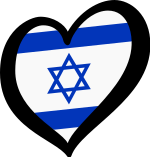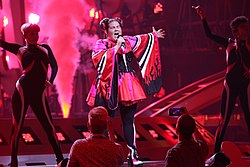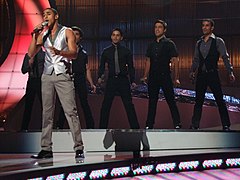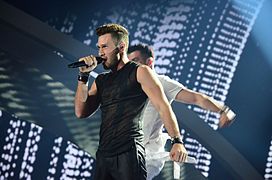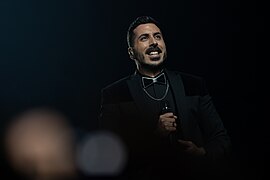Israel at the Eurovision Song Contest
- Broadcasting company

- First participation
- 1973
- Number of participations
- 42 (as of 2019)
- Highest ranking
- 1 ( 1978 , 1979 , 1998 , 2018 )
- Highest Score
- 529 (2018)
- Lowest Score
- 4 ( 1993 , 2006 )
- Points average (since first post)
- 78.02 (as of 2019)
- Average points per voting country in the 12-point system
- 2.50 (as of 2019)
This article looks at the history of Israel as a participant in the Eurovision Song Contest .
Regularity of participation and successes in competition
As the first non-European country, Israel made its debut in 1973 at the Eurovision Song Contest. The debut was quite successful: the country finished fourth out of 17 in the final. Also in 1974 the country reached 7th place and 1976 with 6th place two further placements in the front half of the table. In 1975 and 1977, however, an average place was achieved with 11th place. At the sixth participation in 1978 Israel then won for the first time. Yizhar Cohen & The Alpha-Beta won the competition and achieved a new high of 157 points. In 1979, when Israel first held the competition, Gali Atari & Milk and Honey took first place again, making Israel the second consecutive win. In 1980, when Israel was actually entitled to host it, the competition was to take place on Yom HaZikaron , the day of remembrance of the fallen Israeli soldiers and victims of terrorism. Because of this, the country withdrew from the competition for the first time in 1980. For this reason, Israel is still the only country that was unable to defend its victory the following year. In 1981, however, the country returned.
Hakol Over Habibi came back in 1981 with 7th place, another place in the top ten. In 1982 and 1983 Israel was again very successful and reached 2nd place in each case. In 1984 the country withdrew from the competition again. Another Israeli holiday was given as the reason. In 1985 the country returned to competition. Yizhar Cohen, who won Israel's first victory together with The Alpha-Beta in 1978, took Israel's fifth place in the top ten in 1985. In 1986 Israel achieved its worst result to date. Moti Giladi & Sarai Tzuriel achieved only the penultimate place and with 7 points Israel's lowest score in the competition until then. It was the first time in nine years that an Israeli contribution did not land in the left half of the table. In 1987 the duo Lazy Bums reached 8th place but again a place in the top ten. Another good result was achieved in 1988 with 7th place. In 1989, however, only an average place was achieved with 12th place. In 1990 Rita achieved a rather poor result with place 18 out of 22. In 1991 another success followed in the competition. The duo Datz reached 3rd place and thus another placement among the top ten. In 1992, a good result was achieved again with 6th place. In 1993 Israel's worst result in the competition followed. The group Lahakat Shiru only reached the penultimate place and got a new low score for Israel in the competition with only four points. To date, it is the lowest score Israel has ever achieved in the competition. Because of this poor placement, the country had to sit out in 1994. It was not until 1995 that the country was allowed to participate again.
In 1995 Israel returned to the competition and reached 8th place with Liora. In 1996 Israel took part in the internal preliminary decision of the EBU, but only reached the last place and was therefore not allowed to participate in 1996. The following year, 1997, the country voluntarily decided not to participate. In 1998 Israel returned to the competition and sent a transsexual person, Dana International, to the competition, which was controversial in Israel. After an exciting scoring, Israel won in the end. With 172 points, Dana International also achieved a new high for her country by then. In 1999 Israel hosted for the second time. The band Eden achieved another good result for the country with 5th place. From 2000 to 2004 Israel then had its worst phase in the competition. No contribution from the country was able to achieve a placement in the top ten. In 2000, the country was only third from bottom. In 2001 and 2003, Israel achieved poor places on average with 16th and 19th place. In 2002, with 12th place, only an average placement was achieved. In 2004, when the semifinals were introduced, a new low was reached: David D'Or narrowly missed the final with 11th place in the semifinals, which meant that Israel was eliminated in the semifinals for the first time. Not until 2005 did Israel improve again.
In 2005 referee Maimon finally achieved Israel's best result since Dana International's victory in 1998 with fourth place. In 2006, however, Israel was only penultimate in the final and, as in 1993, only achieved four points. In 2007, the country was eliminated in the semi-finals for the second time. In 2008, Boaz Mauda reached fifth place in the semifinals, making Israel the first time in two years to take part in the final. There he achieved the best result since 2005 with 9th place. The country also reached the finals in 2009 and 2010, but was only able to place in the midfield with 16th and 14th place. From 2011, Israel's previous low point in competition followed. In 2011, the country sent Dana International, which had already won in 1998, to compete again. However, she could not repeat her success of 1998. She was eliminated in the semifinals. The country also missed the final in 2012 and 2013. In 2014, the country was penultimate in the semi-finals and was eliminated for the fourth time in a row in the semi-finals. It was not until 2015 that the country was competitive again.
In 2015 Israel then sent Nadav Guedj to the competition, who reached 3rd place in the semifinals and thus Israel participated in the final for the first time since 2010. Here he achieved Israel’s best result in seven years with 9th place. Also in 2016, Hovi Star was able to qualify for the finals and took 14th place in the midfield. In 2017 Imri Ziv, like Nadav Guedj in 2015, reached 3rd place in the semi-finals. In the final, however, he was less successful and ended up only in the lower ranks with 23rd place. Israel was all the more successful in 2018. Netta Barzilai won the semi-finals and was also able to win the final, which is Israel's fourth victory in the competition. With 529 points she also got a new high score for the country in the competition. In 2019, Israel hosted the competition for the fourth time, but this time for the first time in Tel Aviv. There the singer Kobi Marimi could not build on the success of the previous year. In the end, he reached number 23
A total of 20 of the 42 entries ended up in the left half of the table. With four wins (1978, 1979, 1998, 2018), two second places (1982, 1983) and one third place (1991), Israel is one of the more successful participants in the competition. The country has never finished last and only missed the finals six times.
List of posts
Color legend: - 1st place. - 2nd place. - 3rd place. - Equal points with last place. - Eliminated in the semifinals / in the qualification / in the Eastern European preliminary decision. - no participation / not qualified. - Cancellation of the Eurovision Song Contest.
| year | Interpreter | Title Music (M) and Text (T) |
language | translation | final | Semi-final / qualification |
National preliminary decision |
||
|---|---|---|---|---|---|---|---|---|---|
| space | Points | space | Points | ||||||
| 1973 |
Ilanite אילנית |
'Ey sham (אי שם) M: Nurit Hirsh ; T: Ehud Manor |
Hebrew | Somewhere | 4/17 | 97 | Direct participation | internal selection | |
| 1974 |
Poogy כוורת |
Natati la Chaiai (נתתי לה חיי) M: Dani Sanderson; T: Dani Sanderson, Alon Oleartchick |
Hebrew | I gave her my life | 7/17 | 11 | internal selection | ||
| 1975 |
Shlomo Artzi שלמה ארצי |
'At va-'ani (את ואני) M: Shlomo Artzi; T: Ehud Manor |
Hebrew | You and me | 11/19 | 40 | internal selection | ||
| 1976 |
Chocolate Menta Mastik שוקולד מנטה מסטיק |
'Emor shalom (אמור שלום) M: Matti Caspi; T: Ehud Manor |
Hebrew | Say hello' | 6/18 | 77 | internal selection | ||
| 1977 |
Ilanite אילנית |
'Ahava hi shir li-shnayim (אהבה היא שיר לשניים) M: Eldad Shrim; T: Edna Peleg |
Hebrew | Love is a song for two | 11/18 | 49 | internal selection | ||
| 1978 |
Yizhar Cohen & The Alpha Beta יזהר כהן והאלפא ביתא |
A-ba-ni-bi (א-ב-ני-בי) M: Nurit Hirsh; T: Ehud Mano |
Hebrew | Me (in B language , a child's secret language) | 1 /20 | 157 | Israel Song Festival 1978 | ||
| 1979 |
Gali Atari & Milk and Honey גלי עטרי וחלב ודבש |
Hallelujah (הללויה) M: Kobi Oshrat; T: Shimrit Orr |
Hebrew | Praise God | 1 /19 | 125 | Israel Song Festival 1979 | ||
| 1980 | The Brothers & The Sisters האחים והאחיות |
Pizmon Chozer (פזמון חוזר) M / T: Gideon Koren |
Hebrew | Chorus |
Participation withdrawn public holiday in Israel |
Israel Song Festival 1980 | |||
| 1981 |
Hakol Over Habibi הכל עובר חביבי |
Ha-layla (הלילה) M: Shuki Levi ; T: Shlomit Aharon, Yuval Dor |
Hebrew | This evening | 7/20 | 56 | Direct participation | Kdam Eurovision 1981 | |
| 1982 |
Avi Toledano אבי טולדנו |
Hora (הורה) M: Avi Toledano; T: Yoram Tahar-Lev |
Hebrew | Hora | 2/18 | 100 | Kdam Eurovision 1982 | ||
| 1983 |
Ofra Haza עפרה חזה |
Chai (חי) M: Avi Toledano; T: Ehud Manor |
Hebrew | Lively | 2/20 | 136 | Kdam Eurovision 1983 | ||
| 1984 |
Ilanite אילנית |
Balalaika (בללייקה) M: Kobi Oshrat; T: Yoram Teharlev |
Hebrew | - |
Participation withdrawn public holiday in Israel |
Kdam Eurovision 1984 | |||
| 1985 |
Yizhar Cohen יזהר כהן |
Olé olé (עולה עולה) M: Kobi Oshrat; T: Hamutal Ben Ze'ev |
Hebrew | - | 5/19 | 93 | Direct participation | Kdam Eurovision 1985 | |
| 1986 |
Moti Giladi & Sarai Tzuriel מוטי גלעדי ושרי צוריאל |
Yavo yom (יבוא יום) M: Yoram Zadok; T: Moti Galadi |
Hebrew | A day will come | 19/20 | 7th | Kdam Eurovision 1986 | ||
| 1987 |
Lazy bangs נתן דטנר ואבי קושניר |
Shir ha-batlanim (שיר הבטלנים) M / T: Zohar Laskov |
Hebrew | Loafers song | 8/22 | 73 | Kdam Eurovision 1987 | ||
| 1988 |
Jardena Arasi ירדנה ארזי |
Ben 'adam (בן אדם) M: Boris Dimitshtein; T: Ehud Manor |
Hebrew | A human | 7/21 | 85 | Kdam Eurovision 1988 | ||
| 1989 |
Gili & Galit גילי וגלית |
Derekh ha-melekh (דרך המלך) M / T: Shaike Paikov |
Hebrew | The royal road | 12/22 | 50 | Kdam Eurovision 1989 | ||
| 1990 |
Rita ריטה |
Shara ba-rkhovot (שרה ברחובות) M: Rami Kleinstein; T: Tzruya Lahav |
Hebrew | Singing in the streets | 18/22 | 16 | internal selection | ||
| 1991 |
Duo Datz אורנה ומשה דץ |
Kan (כאן) M / T: Uzi Chitman |
Hebrew | Here | 3/22 | 139 | Kdam Eurovision 1991 | ||
| 1992 |
Dafna Dekel דפנה |
Ze rak sport (זה רק ספורט) M: Kobi Oshrat; T: Ehud Manor |
Hebrew | It's just sport | 6/23 | 85 | Kdam Eurovision 1992 | ||
| 1993 |
Lahakat Shiru להקת שירו |
Shiru (שירו) M: Shaike Paikov; T: Yoram Taharlev, David Chris |
Hebrew, English | Sings | 24/25 | 4th | Kdam Eurovision 1993 | ||
| 1994 | Not qualified | ||||||||
| 1995 |
Liora ליאורה |
Amen (אמן) M: Moshe Datz; T: Hamutal Ben Ze'ev |
Hebrew | That's how it should be | 8/23 | 81 | Qualified directly for the final | Kdam Eurovision 1995 | |
| 1996 |
Galit Bell גלית בל |
Shalom olam (שלום עולם) M / T: Eyal Madani, Doron Vitenberg |
Hebrew | Hello World |
Not qualified qualifying round |
28/29 | 12 | Kdam Eurovision 1996 | |
| 1997 | No participation | ||||||||
| 1998 |
Dana International דנה אינטרנשיונל |
Diva (דיווה) M: Tzvika of spades; T: Yoav Ginai |
Hebrew | - | 1 / 25th | 172 | Qualified directly for the final | internal selection | |
| 1999 |
Eden עדן |
Yom huledet (Happy Birthday) (יום הולדת(Happy Birthday)) M / T: Moshe Datz, Gabriel Batler, Yaacov Lymay, Jacky Oved |
Hebrew, English | Happy Birthday | 5/23 | 93 | internal selection | ||
| 2000 |
Ping pong פינגפונג |
Sa'me'akh (Be Happy) (שמייח(Be Happy) M: Roi Arad, Guy Asif; T: Roi Arad, Guy Asif, Ronen Ben Tal |
Hebrew a. | Happy | 22/24 | 7th | internal selection | ||
| 2001 |
Valley Sondak טל סונדק |
'En davar (אין דבר) M: Yair Klinger; T: Shimrit Orr |
Hebrew | Never mind | 16/23 | 25th | Kdam Eurovision 2001 | ||
| 2002 |
Sarit Hadad שרית חדד |
Nadlik beyachad ner (Light a Candle) (נדליק ביחד נר(Light a Candle) M: Tzvika of Spades; T: Yoav Ginai |
Hebrew, English | Light a candle (together we light a candle) | 12/24 | 37 | internal selection | ||
| 2003 |
Lior Narkis ליאור נרקיס |
Milim La'ahava (Words for Love) (מילים לאהבה(Words for Love) M: Yoni Ro'en; T: Yossi Gispan |
Hebrew, English b. | Words of love | 19/26 | 17th | internal selection | ||
| 2004 |
David D'Or דוד ד'אור |
Leha'amin (To Believe) (להאמין(To Believe)) M / T: David D'Or |
Hebrew, English | To believe (to believe) | Eliminated | 11/22 | 57 | internal selection | |
| 2005 |
Referee Maimon שירי מימון |
Hasheket shenish'ar (The Silence That Remains) (השקט שנשאר(The Silence That Remains) M: Pini Aronbayev; T: Eyal Shachar, Pini Aronbayev |
Hebrew, English | The silence that remains | 4/24 | 154 | 7/25 | 158 | Kdam Eurovision 2005 |
| 2006 |
Eddie Butler אדי בטלר |
Ze Hazman (Together We Are One) (זה הזמן(Together We Are One) M: Eddie Butler; T: Osnat Tsabag, Orly Burg |
Hebrew, English | Together we are one (this is the time) | 23/24 | 4th | Qualified directly for the final | Kdam Eurovision 2006 | |
| 2007 |
Tea packs טיפקס |
Push the Button (Kaftor Adom) (Push the Button (כפתור אדום)) M / T: Kobi Oz |
Hebrew, English, French | Push the button | Eliminated | 24/28 | 17th | internal selection | |
| 2008 |
Boaz Mauda בועז |
The Fire in Your Eyes (Ke'ilu Kan) (The Fire in Your Eyes (כאילו כאן)) M: Dana International ; T: Dana International , Shai Kerem |
Hebrew, English | The fire in your eyes | 9/25 | 124 | 5/19 | 104 | Kdam Eurovision 2008 |
| 2009 |
Noa & Mira Awad אחינועם ניני ומירה עוואד |
There Must Be Another Way (Einach) (There Must Be Another Way (עינייך)) M / T: Noa, Mira Awad, Gil Dor |
Hebrew, English, Arabic |
There must be another way (your eyes) | 16/25 | 53 | 7/18 | 75 | Kdam Eurovision 2009 |
| 2010 |
Harel Skaat הראל סקעת |
Milim (מילים) M: Tomer Hadadi; T: Noam Horev |
Hebrew | Words | 14/25 | 71 | 8/17 | 71 | Kdam Eurovision 2010 |
| 2011 |
Dana International דנה אינטרנשיונל |
Ding Dong (דינג דונג) M / T: Dana International |
Hebrew, English | - | Eliminated | 15/19 | 38 | Kdam Eurovision 2011 | |
| 2012 |
Izabo איזבו |
Time M: Ran Shem-Tov; T: Shiri Hader |
English, Hebrew | time | Eliminated | 13/18 | 33 | internal selection | |
| 2013 |
Moran Mazor מורן מזור |
Rak bishvilo (רק בשבילו) M: Chen Harari; T: Gal Sarig |
Hebrew | Just for him | Eliminated | 14/17 | 40 | Kdam Eurovision 2013 | |
| 2014 |
My fine gold מיי פיינגולד |
Same Heart M / T: Rami Talmid |
English, Hebrew | Same heart | Eliminated | 14/15 | 19th | Kdam Eurovision 2014 | |
| 2015 |
Nadav Guedj נדב גדג |
Golden Boy M / T: Doron Medal |
English | Golden boy | 9/27 | 97 | 3/17 | 151 | HaKokhav HaBa 2015 |
| 2016 |
Hovi Star חובי סטאר |
Made of Stars M / T: Doron Medal |
English | Made from stars | 14/26 | 135 | 7/18 | 147 | HaKokhav HaBa 2016 |
| 2017 |
Imri Ziv אימרי זיו |
I Feel Alive M / T: Dolev Ram, Penn Hazut |
English | I feel alive | 23/26 | 39 | 3/18 | 207 | HaKokhav HaBa 2017 |
| 2018 |
Netta Barzilai נטע ברזילי |
Toy M / T: Doron Medalie , Stav Beger |
English, Hebrew | toy | 1 / 26th | 529 | 1/19 | 283 | HaKokhav HaBa 2018 |
| 2019 |
Kobi Marimi קובי מרימי |
Home M / T: Ohad Shragai, Inbar Vaizman |
English | At home | 23/26 | 35 | Qualified directly for the final | HaKokhav HaBa L'Eurovizion 2019 | |
|
|
Eden Alene עדן אלנה |
Feker Libi M / T: Doron Medalie , Idan Raichel |
English, Hebrew, Amharic , Arabic , Constructed Language | Loved |
Cancellation due to the COVID-19 pandemic by the EBU |
HaKokhav HaBa L'Eurovizion 2020 | |||
| 2021 |
Eden Alene עדן אלנה |
|
|||||||
National preliminary decisions
In the first few years the broadcaster chose the participants internally, after which the Hebrew Song and Choir Festival took place in 1978 and 1979 as a preliminary decision. In the following years Kdam established itself as Israel's preliminary decision. Until 1996, the preliminary decision was only waived in 1990. From 1998 to 2004, Israel selected the majority of its contributions internally, only in 2001 Kdam took place again. From 2005 to 2014 Kdam established itself again as a preliminary decision. During this time, the preliminary decision was only waived in 2007 and 2012 and elected internally. In 2013, for the 40th anniversary, the Kdam preliminary decision was expanded to include several preliminary rounds and a second chance round, similar to the Swedish Melodifestivalen .
From 2015 to 2020, the winner of the casting show HaKokhav HaBa was selected as the ESC representative, but the title was often selected internally. Only in 2016 was the song also selected in the program, but revised after the selection. In 2020 an external preliminary decision for the song by Eden Alene was held. In 2021, Eden Alene should again find her song for Rotterdam in a specially designed preliminary decision.
languages
Israel has remained very faithful to its official language, Hebrew, for a long time. Up to and including 1998, all contributions were sung in this language. This also applies to the years in which there was no language regulation (i.e. from 1973 to 1976). From 1999 the contributions were often mixed with English , the mixture of Hebrew chorus and English verse was particularly common. In 2009, There must be another way was presented in Hebrew and English as well as in the second official language, Arabic .
In 2015, the Israeli contribution was sung entirely in English for the first time. In the years that followed, English was also sung more often (2016, 2017, 2019). In 2018, however, Toy was mostly written in English, but also contained a few words and lines from the Hebrew language. This was the first time since 2014 that the language appeared in the competition. In 2020 Israel wanted to send a five-language contribution that would have been sung in English, Hebrew, Arabic, a constructed language and in Amharic . The latter would have been listed in the competition for the first time, but the competition was canceled due to the COVID-19 pandemic .
Competitions held
| year | city | venue | Moderation |
|---|---|---|---|
| 1979 | Jerusalem | International Convention Center | Daniel Pe'er & Yardena Arazi |
| 1999 | Yigal Ravid , Dafna Dekel & Sigal Shachmon | ||
| 2019 | Tel Aviv | Tel Aviv Convention Center | Erez Tal , Bar Refaeli , Assi Azar & Lucy Ayoub |
Scoring
The following countries received the most points from or awarded the most points to Israel (as of 2019):
|
|
|
|
||||||||||||||||||||||||||||||||||||||||||||||||||||||||||||||||||||||||||||||||||||
Award of the highest rating
Since 1975, Israel has awarded the highest number of points in the final in 23 different countries, four of them to the United Kingdom. In the semifinals, Israel awarded the maximum number of points to 13 different countries, including three each to Australia and Russia.
|
|
|||||||||||||||||||||||||||||||||||||||||||||||||||||||||||||||||||||||||||||||||||||||||||||||||||||||||||||||||||||||||||||||||||||||||||||||||||||||||||||||||||||||||||||||||||||||||||||||||||||||||||||||||||||
various
- In 2010, Harel Skaat with his title Milim was the first participant in a Eurovision Song Contest , which managed to win all three categories of the Marcel Bezençon Prize .
- During the awarding of points in the final of the Eurovision Song Contest on May 13, 2017 in Kiev , Israel's points spokesman announced that the country would no longer be able to participate in the competition because the previously responsible broadcaster Israel Broadcasting Agency (IBA) would be closed. In the following year, the successor broadcaster Israeli Public Broadcasting Corporation (IPBC) became a member of the EBU and Israel continued to participate.
Impressions
Individual evidence
- ↑ esctoday.com Israel: IPBC applies for European Broadcasting Union membership
